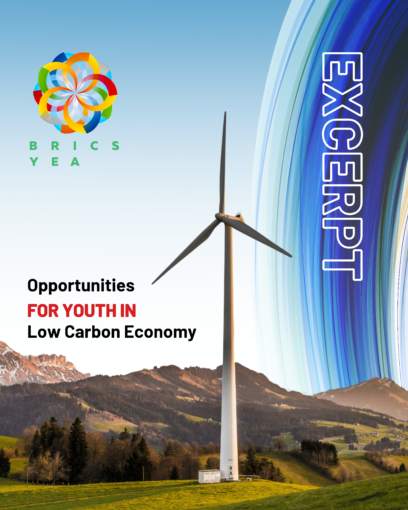15 July 2023
Opportunities For Youth In Low Carbon Economy
The term ‘low-carbon economy’ refers to a green ecological economy based on low levels of pollution and lower energy consumption. In general terms, it is an economy based on sustainable actions, which mainly focuses on reducing or sequestering the gases responsible for the greenhouse effect which is generated in the production chain; ensuring that the economic development does not have a severe impact on the environment.
The journey towards decarbonization is a financial as well as a humanistic vision. This vision can be traced back to the Rio de Janeiro Earth Summit in 1992 where low-carbon development was introduced for the first time in such a grand space.
Among the BRICS nations, South Africa has paved a path to move towards a low carbon economy, working on the concept of ‘Just Transition’. The concept basically deals with the increasing use of renewable energy resources but to carry on with ease, it demands that the negative consequences on jobs, supply chains, and communities are properly addressed, and the benefits shared equally.
Statistics and General Review
The transition to a low-carbon economy carries the potential to increase job opportunities. Based on the data provided by the International Renewable Energy Agency, it is estimated that nearly 18 million people will have green jobs in the coming decade.
Youth comprises a large part of the population in BRICS nations which calls for the generation of employment for them. The youth unemployment rate in 2022 was recorded at 18.8%. The nations can’t achieve and sustain development if a large segment of youth is alienated and not prepared to lead their country. To reduce this unemployment among youth, the government should also support innovations in business affairs by enabling efficient policies. A comprehensive policy approach that’s capable of stimulating investments in the green sector and working on the skills and employability of workers would have a larger positive impact on the youth labor market.
Youth employment in the green sector
Green jobs, specifically, allow businesses and communities to accommodate climate change. They focus on reducing the consumption of energy and raw materials, greenhouse emissions and protecting and restoring ecosystems. Students, freshmen, and young workers are better equipped to anticipate and manage these changes and establish relevance in these new occupations and profiles as they have more detailed education and awareness about environmental sustainability as compared to the previous generation. The better standards of the education system focused on the development of new skills and competencies required by employers in the green market can make it easy for them to adapt to changing labor market requirements. Green jobs are often associated with technology-rich environments, a skilled field dominated by young workers.
The fundamental measures to create green job opportunities for youth include investment, trade, macroeconomic, and enterprise development policies to promote job-rich green growth. The measures also include education, training, and labor market policies to prepare the youth to take up green jobs. A national employment policy can be instrumental in working in all these dimensions. For instance, in Senegal, with the help of the Partnership for Action in the Green Economy (PAGE) a National Strategy on Green Jobs was formulated that was later merged with the national employment policy.
Green jobs for youth can be created during different phases of the policy cycle, by analyzing the situation and then evaluating the implemented policy a, with the national dialogue underpinning them. A policy vision emerging from young national actors in the social and environmental fields, including youth-led organizations must be invited to actively participate in the policy dialogue. Youth-specific labor markets should also be assessed.
Sector-specific approach
Certain sectors offer a higher scope for investment in green technologies and building green value chains because of their sustainable nature and growing consumer market. This increases the potential for generating green jobs, especially for youth.
Young people can become integral stakeholders in advancing the green transformation of agriculture by embracing and exercising innovations. Detailed research by the International Labour Organisation (ILO) in 2020 exhibits that innovations in Information and Communication Technology (ICT) can turn out to be a prime reason for improving agriculture and youth employment. For example, MYSoko is a virtual farmers market created by Mkulima Young in Kenya where buyers and sellers can finalize transactions. Social networking sites are becoming a powerful channel to share knowledge and experiences.
To change the perceptions of young people about agriculture, social media, networking, and participation in the policy dialogue can become a useful instrument. In renewable energy, rapid growth and investments hold potential for youth employment. Installation of photovoltaic panels, wind-powered devices, solar-heated home systems, and large hydropower projects are some of the related works. According to IRENA, the production of photovoltaic panels employs twice as many people per unit of electricity generation as coal or natural gas. Improved energy access has resulted in the creation of jobs that are currently temporary but have the potential to become permanent livelihoods. The expansion of renewable energy is a golden opportunity for unemployed youth in rural areas. For example, a business named Ignite Power intends to link youth with employment by distributing renewable energy. The company provides free training and skill development programs on solar panel installation and maintenance, setting up a small business in mobile money transfers, and decentralizing charging stations. The increasing use of new technology and the rise in the productivity of rural enterprises in the energy sector would stimulate local economic development and youth employment.
The Social Responsibility Implementation Programme has been launched in South Africa to produce and develop employment in the tourism sector, with a particular focus on skill development and training.
Over the past few years, South Africa has implemented large-scale public work programs related to the environment. An ecological restoration program known as Working for Water has been designed to generate jobs, especially for youth and women. It provided training and employment to more than 300,000 people over its 20-year lifespan.
Promotion of Entrepreneurship
Entrepreneurship is best suited for the creation of green jobs for youth. According to a research paper by the International Labour Organisation (ILO), entrepreneurship programs have the highest impact among all active labour market policies for young people. Green business ideas and the promotion of green business practices have been taken up by many generic entrepreneurship programs over the past decade. A relevant example of the role of generic training instruments evolving into a support package for young green entrepreneurs is The Youth Entrepreneurship Facility program in East Africa. It has achieved large-scale outreach and sustainable institutional impact from 2010 to 2014.
Conclusion
Transforming the economy doesn’t automatically generate decent jobs for young people. There needs to be a dedicated initiative to either take up full-fledged green jobs promotion or blend it within the existing system. A green job strategy for youth must be formalized to help them register their green businesses and there should be initiatives to organize them as workers in cooperatives.
There is scope to channelize youth potential towards the development of green jobs. Through this, the youth employment challenge can be solved to a large extent while preserving the environment and making the economy more resilient to climate change.
Author: Nidhi Soni, The Geostrata
Share news


